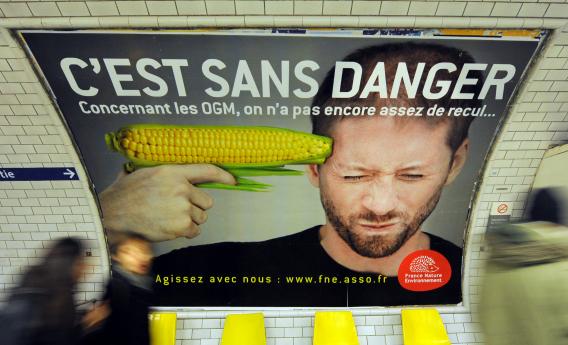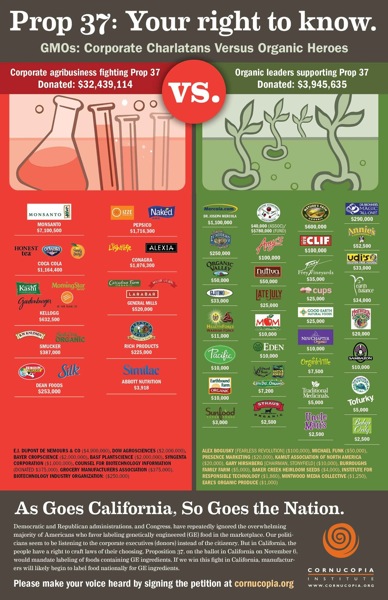- What is GMO?
- GMO stands for genetically modified organism and is defined as “an organism whose genetic material has been altered using genetic engineering techniques.” The technique used to create GMOs is called recombinant DNA. DNA molecules from different organisms are combined to create one molecule of DNA, and are then transferred to an organism, causing its genetic makeup to change.
- How do GMO’s affect you?
- This technique is often used in creating the food that we eat. It is used in plants mostly to give the plant a resistance to commercial herbicides. It is used in animals to enhance production of food or to add quality traits to the food such as making animals grow bigger.
- Concerns about genetically modified (GM) foods keep growing. There has been much controversy surrounding GMO’s because it is tampering with nature. Genetically modified food has been around for a few decades. However, there is much secrecy surrounding patents of genetically modified food, a risk of genetic modifications undesirably spreading to other foods, and irresponsible behavior from some biotech companies.
- More alarming news is spreading finding Monsanto corn causes cancer.
- Controversy and furor are now linked to the study.
- More news: Del Monte, one of the world’s largest growers and distributors of pineapples has developed a genetically modifiedpineapple. It is currently being grown in Costa Rica, one of the top pineapple-producing countries. It has just received approval by the USDA for eventual sale in the U.S.
- Proposition 37, a Mandatory Labeling of Genetically Engineered Food Initiative, was on the November 6, 2012 ballot in California.
- Prop 37 required labeling of food sold to consumers made from plants or animals with genetic material changed in specified ways.
- Dr. Joseph Mercola is one of the main financial supporters of the initiative. According to Mercola, “Your health care, your food supply, everything you need to live a healthy life is now being taken away and controlled by a massive industrial complex and corrupt government.”
- For more, see related links:
- http://www.nytimes.com/2012/09/20/business/energy-environment/disputed-study-links-modified-corn-to-greater-health-risks.html
- http://the-scientist.com/2012/09/25/anti-gm-crop-study-gets-audited/
- http://www.efsa.europa.eu/en/press/news/gmo070628.htm
- http://www.efsa.europa.eu/en/efsajournal/doc/753.pdf
- http://www.efsa.europa.eu/en/efsajournal/doc/19r.pdf
- http://news.discovery.com/earth/gm-corn-tumor-study-120920.html#mkcpgn=emnws1
- http://www.bbc.co.uk/news/science-environment-19654825
- An interesting reading suggestion: a husband and wife take you on 1 year journey and show you what they do as geneticists and organic farmers.
- Tomorrow’s Table: Organic Farming, Genetics, and the Future of Food, by husband-wife team Pamela C. Ronald (a plant geneticist at UC Davis) and R. W. Adamchak (an organic farming professor at UC Davis).
- For a list of GMO-free food companies.
- REFERENCES:1. “A List of GMO Free Food Companies.” Whydontyoutrythis.com. Why Don’t You Try This?, 28 June 2013. Web. 24 March 2014.
- 2. “French GMO Research Finds Monsanto Corn Causes Cancer: America Should Pay Attention.” PolicyMic. N.p., 06 Oct. 2012. Web. 24 Mar. 2014.
- 3. “French GM-fed Rat Study Triggers Furore.” BBC News. BBC, 19 Sept. 2012. Web. 24 Mar. 2014.
4. “California 2012 Ballot Propositions.” Ballotpedia. Ballotpedia, n.d. Web. 24 Mar. 2014.
5. “50 Countries Label Genetically Engineered Foods – When Will Americans Have the Right to Know and Choose?” Mercola.com. Mercola.com, 27 Sept. 2012. Web. 24 Mar. 2014.



















One Comment